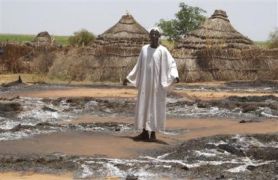Sudan panel acknowledges rights abuse in Darfur but rejects genocide
KHARTOUM, Jan 20 (AFP) — An official Sudanese committee of inquiry has determined that serious human rights abuses have been committed in the troubled Darfur region but rejected claims of ethnic cleansing and systematic rape.

|
|
A man from Um Hashab village in Sudan’s Darfur region gestures from his burned hut, (AP). |
“Serious human rights violations took place in the three states of Darfur, in which all parties to the conflict were involved to varying degrees, thus leading to human suffering of the people of Darfur, causing internal displacement and people taking refuge in neighboring Chad,” the committee said.
The international community and human rights groups have long raised concerns about the situation in Darfur, where ethnic rebels have been fighting the Khartoum government and its allied militias since February 2003.
But the committee report unveiled Wednesday added: “What had happened in Darfur despite its graveness did not constitute a genocide crime.
“The commission has concluded that incidents of rape and sexual abuses took place in the various states of Darfur but it has not been proven to the commission that there was systematic and widespread abuse that would constitute a crime against humanity.”
An uprising launched by ethnic minority rebels in early 2003 prompted the government in Khartoum to launch a bloody crackdown by Arab militias that Washington has said amounted to genocide.
Around 70,000 people are estimated to have died in the past several months alone, according to figures from the United Nations and aid agencies. Some 1.5 million more have fled their homes, many seeking refuge beyond Sudan’s borders.
On Tuesday, the human rights watchdog Amnesty International said perpetrators of war crimes and crimes against humanity should be brought to justice as a necessary step in securing a “lasting peace” in Sudan.
“Establishing individual criminal responsibility, truth and full reparations for the victims is crucial to create lasting peace in Sudan,” Amnesty said. “No serious step has been taken to bring anyone to justice.”
But Amnesty praised a probe mandated by the UN Security Council, with a report due on January 25, as “the first serious formal attempt to investigate” abuses in Darfur.
The Sudanese commission, formed by presidential order in mid-2004 and headed by a former chief justice, Dafalla al-Hajj Yusuf, said it toured the three states of Darfur and took testimony from 288 people.
But it said the members could not meet with the Darfur rebels, who had declined to cooperate.
“Those killed on all sides including the Sudanese armed forces and the police does not exceed a few thousand persons,” it said. “The figures widely circulated in the media… are not accurate.”
The panel called for a “legal committee to be formed to investigate allegations of persecution outside the legal system”, and of specific cases of evictions from villages in southern Darfur.
Incidents in three towns where “injured persons were killed and burned alive in hospitals”, according to testimony gathered by the commission, should also be probed, it said.
